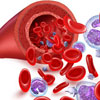Aspirin a viable treatment for serious blood clots
Low-dose aspirin is a cheap and effective way to prevent potentially deadly blood clots in the leg or the lungs in patients who have had a previous blood clot, a new study shows.
The study, conducted by the National Health and Medical Research Council’s Clinical Trials Centre at the University of Sydney, and a team of international investigators, is published in The New England Journal of Medicine.
The study has found that people who have suffered blood clots in the veins of the leg (deep vein thrombosis or DVT) or the lungs (pulmonary embolism or PE) are less likely to suffer a recurrence of the serious blood clots or a cardiac event if they take low-dose aspirin. These conditions affect approximately one in 1000 people in Australia each year.
“The results of this study suggest the simple, inexpensive treatment of low-dose aspirin could prevent thousands of patients from experiencing recurrent clots each year and may make substantial healthcare savings in Australia and worldwide,” Professor John Simes, Director of the NHMRC Clinical Trials Centre at the University of Sydney and chair of the study said.
“These results suggest that aspirin prevents about one third of recurrent blood clot events. For every 1000 patients treated for one year, aspirin can be expected to prevent about 20 to 30 episodes of recurrent major thrombotic events at the cost of about three significant bleeding episodes.”
Operating since 2003, the ASPIRE study completed recruitment of 822 participants from five countries including Australia, New Zealand, Singapore, India and Argentina. All the participants had previously suffered a DVT or PE that occurred for no particular reason, called ‘unprovoked VTE’ (venous thromboembolism).
They had completed on average six months of anti-coagulant treatment, generally with warfarin. They were randomly allocated to receive either low dose enteric coated aspirin or a matching placebo. On average participants were followed for three years.
Dr Tim Brighton, from Prince of Wales Hospital and principal investigator of the study, explained:
“Many patients discontinue warfarin therapy after six or twelve months of treatment due to the inconvenience of regular blood tests and the increased risks of serious bleeding [putting them at high risk of recurring thrombosis].”
“Aspirin reduces the risk of important blood clotting event including recurrent VTE, myocardial infarction, stroke, or cardiovascular death. We now have clear evidence that aspirin is of benefit for patients who are unable or do not wish to continue warfarin in the long term.”
(Source: The University of Sydney: The New England Journal of Medicine)
More information
 | For more information on blood, blood types, blood tests, and blood donation and transfusion, see Blood. |
Dates
Tags
Created by:

 Login
Login














